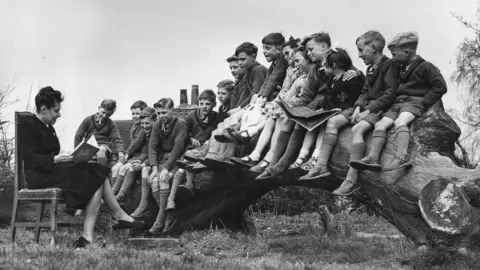IICSA inquiry says UK government should pay Australia child migrants
Thousands of British people who as children were forcibly sent abroad, where many suffered abuse, should be compensated, an inquiry says.
They were sent to Australia and parts of the British Empire from 1945-1970 by charities and the Catholic church.
The Independent Inquiry into Child Sexual Abuse (IICSA) said the government should pay all 2,000 former migrants still alive within 12 months.
The Australian and UK governments apologised in 2009 and 2010.
About 4,000 children, mainly from deprived backgrounds, were sent to Australia, New Zealand, Canada and Southern Rhodesia, now Zimbabwe, between 1945 and 1970, to give them better lives and strengthen the British population abroad.
The inquiry heard from various former migrants who claimed they and others suffered sexual and physical abuse at the hands of those running the schools and orphanages they were sent to.
Norman Johnston, president of the International Association of Former Child Migrants, said the inquiry had "pointed the finger" at the British government.
Mr Johnston, who was deported from Aberdeen at the age of seven, said that former migrants now needed to speak to Prime Minister Theresa May.
"We want to die knowing that justice has been served," he added.
 Getty Images
Getty ImagesThis inquiry focused on England and Wales while separate inquiries have been set up in Scotland and Northern Ireland.
The inquiry's report said all former child migrants should receive compensation - whether or not they were sexually abused - because all had been put at risk of sexual abuse.
Inquiry chairwoman Professor Alexis Jay said: "Child migration was a deeply flawed government policy that was badly implemented by numerous organisations which sent children as young as five years old abroad.
"The policy was allowed to continue despite evidence over many years showing that children were suffering."
The inquiry said the government was "primarily responsible" for the scheme managed by the Catholic church and charities, including Barnardo's and The Fairbridge Society, which is now part of the Prince's Trust.
The report also said the government:
- Failed to ensure children were protected
- Failed to respond to reports of abuse
- Did not want to jeopardise its relationship with the Australian government
- Did not want to upset Barnardo's or the Fairbridge Society
It also found:
- Many of the organisations "enjoyed patronage from persons of influence and position"
- The avoidance of "embarrassment and reputational risk was more important" than care of the children
- Successive governments after 1970 failed to accept full responsibility
- Other institutions involved in the scheme which have failed to apologise should so do so "as soon as possible"

Analysis
By BBC home affairs correspondent Tom Symonds
The child abuse inquiry has been much criticised and this was its first opportunity to show that it could hold institutions to account. Thursday's report does not, as some feared, shrink from apportioning blame.
Its central demand - reparations for the child migrants within months - requires immediate government action.
Much of the evidence was truly historical while the facts were widely accepted.
The abusers are all dead, so the inquiry's dilemma about not acting as a court of law did not come into play.
In short this was one of IICSA's easier pieces of work. Harder inquiries and more controversy lie ahead.

The investigation into child migration is one of the first of dozens of planned inquiries carried out by IICSA since it was set up in 2014 to "expose" past failures and "learn the lessons".
It was conceived after the 2011 death of BBC presenter Jimmy Savile, when hundreds of people came forward to say he had abused them as children, with the spotlight often falling on the institutions which failed to protect them.
A spokesman for the Department for Health and Social Care said the inquiry's report would be "carefully considered" and would be responded to "in due course".
He said "successive governments" have accepted the "misguided and deeply flawed" policy was "wrong" and more than £9m has been made available to former child migrants to help them be reunited with their families.
The Royal Over-Seas League said it "deeply regrets and "apologises for" its support of the child migration policy from the 1920s onwards and "condemns unreservedly the abuse and ill treatment of children".
